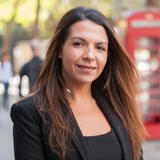Dr Gizem Morris is a Teaching Fellow in Marketing at King’s Business School. She is a qualified Veterinary Surgeon (BVSc) and holds a PhD in Marketing and Psychology from University of Westminster. Her teaching expertise includes affective neuroscience, neuromarketing, psychology, consumer behaviour and entrepreneurial leadership.
Our Pre-University Winter School gives high school students from around the world the opportunity to experience university-level teaching in a broad range of subject areas. It’s designed as an immersive resource for young people who are at the beginning of their university decision-making journey. Beyond the academic seminars, this year students were also invited to a cozy campfire discussion with Dr Gizem Morris, Teaching Fellow at King’s Business School, who had taught on the Business & Economics course earlier in the week. The purpose of this session was to think more about university decision-making, and give our students the chance to quiz their lecturers about their own histories. They may now be leading academics at one of the world’s top universities, but it is worth remembering that our tutors were once themselves teenagers, with the same looming life decisions now faced by the current Pre-University generation. As such, who better to give an insight into the student journey?

Below is a small selection of highlights from the wide-ranging session. For reasons of space, we are unable to cover Dr Morris’ thoughts on UK students’ habits of eating beans for breakfast!
Can you tell us your thoughts about the British university system?
I studied in Cyprus, and in Turkey to become a veterinary surgeon in my exchange years. I studied in Slovakia too. Later, I took my Masters and PhD in the UK, and found that the UK system was totally different: it was very empowering and different from the traditional education system I came from. The very first day I called the teacher ‘professor’, and they said ‘please just call me by my name’. I have found friendship, equality and inclusivity.
How can you be certain about what major to go for?
You can’t be. There is only one way to truly find out, and that is to try it. Is it OK to be anxious about this decision? Absolutely, it’s a big decision, right? I have news for you: if it turns out to be the wrong decision, you have the power to change it. The decisions you make now are not life sentences. I have friends who knew what they wanted to be when they were five years old and they had a very consistent career, and I admired them. I studied veterinary science as it was my passion, but later I went on to study business and neuroscience. You always have the power to change direction.
What is the single biggest way in which being part of the King’s community has changed you?
That’s a very personal question, and I’m not sure to what extent I can go right down to the roots of this question. But let me say this: I remember once sitting out on the top of Bush House having a drink with colleagues, talking about future research that was not yet available to the public, talking to really intelligent people, researchers whose findings are going to have an impact on the government and on society. You feel like you are on top of the world, being part of this team and getting to witness all of this when you are young.
